| Listing 1 - 9 of 9 |
Sort by
|
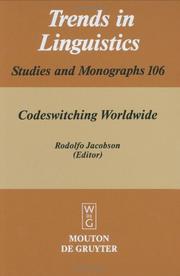

ISBN: 3110151510 3110812193 9783110812190 9783110151510 Year: 2011 Volume: 106 Publisher: Berlin Boston
Abstract | Keywords | Export | Availability | Bookmark
 Loading...
Loading...Choose an application
- Reference Manager
- EndNote
- RefWorks (Direct export to RefWorks)
No detailed description available for "CODESWITCHING WORLDWIDE 1 (JACOBSON) TILSM 106 E-BOOK".
Code switching (Linguistics) --- Bilingualism --- Changement de code (Linguistique) --- Bilinguisme --- Language shift --- Switching (Linguistics) --- Linguistics --- Diglossia (Linguistics) --- Script switching (Linguistics)

ISBN: 9027225419 9786613359322 1283359324 9027279993 9789027279996 9789027225412 9781283359320 6613359327 Year: 1984 Volume: vol 8 Publisher: Amsterdam Benjamins
Abstract | Keywords | Export | Availability | Bookmark
 Loading...
Loading...Choose an application
- Reference Manager
- EndNote
- RefWorks (Direct export to RefWorks)
Code-switching and related phenomena have met with linguists' increasing interest over the last decade. However, much of the research has been restricted to the structural (grammatical) properties of the use of two languages in conversation; scholars who have tried to capture the interactive meaning of switching have often failed to go beyond more or less anecdotal descriptions of individual, particularly striking, cases. The book bridges this gap by providing a coherent, comprehensive and generative model for language alternation, drawing on recent trends and methods in conversational analysis. The empirical basis is the speech of Italian migrant children in Constance, Germany.
Pragmatics --- Conversatie. --- Codewisseling [Taalwetenschap]. --- Bilinguisme --- Conversation. --- Codes (Passage de) [Linguistique]. --- Tweetaligheid. --- Code switching (Linguistics) --- Talking --- Colloquial language --- Etiquette --- Oral communication --- Language shift --- Switching (Linguistics) --- Bilingualism --- Linguistics --- Diglossia (Linguistics) --- Script switching (Linguistics) --- Changement de code (linguistique) --- Linguistique --- Conversation
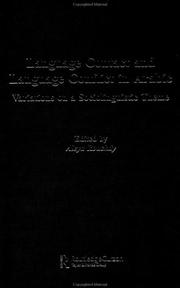
ISBN: 0700713794 0415567793 0203037219 1283886243 1136122184 1136122265 9781136122187 9780700713790 Year: 2002 Publisher: Oxon [England] : Routledge,
Abstract | Keywords | Export | Availability | Bookmark
 Loading...
Loading...Choose an application
- Reference Manager
- EndNote
- RefWorks (Direct export to RefWorks)
This book contains 17 studies by leading international scholars working on a wide range of topics in Arabic socio-linguistics, divided into four parts. The studies in Part 1 address questions of national language planning in a diglossic situation, with a particular focus on North Africa. Part 2 explores the relationship of identity and language choice in different Arabic-speaking communities living both within and outside the Arab World. Part 3 examines language choice in such diverse contexts as popular preaching, humour and Arab women's writing. Part 4 contains 5 papers in which variation,
Arabic language --- Languages in contact --- Diglossia (Linguistics) --- Code switching (Linguistics) --- Arabe (Langue) --- Arabe (Langue) à l'étranger --- Langues en contact --- Diglossie (Linguistique) --- Changement de code (Linguistique) --- Social aspects. --- Dialects --- Foreign countries --- Aspect social --- Dialectes --- Arabe (Langue) à l'étranger --- Languages in contact. --- Semitic languages --- Areal linguistics
Book
ISBN: 0262320355 0262027895 1322474907 0262320363 9780262320351 9780262027892 Year: 2014 Publisher: Cambridge, Massachusetts
Abstract | Keywords | Export | Availability | Bookmark
 Loading...
Loading...Choose an application
- Reference Manager
- EndNote
- RefWorks (Direct export to RefWorks)
Theoretically significant work on the grammar of codeswitching by the leading researchers in the field.
Code switching (Linguistics) --- Education, Bilingual. --- Grammaticality (Linguistics) --- Grammaticalness (Linguistics) --- Bilingual education --- Language shift --- Switching (Linguistics) --- Acceptability (Linguistics) --- Grammar, Comparative and general --- Linguistics --- Bilingualism --- Multilingual education --- Diglossia (Linguistics) --- LINGUISTICS & LANGUAGE/General --- COGNITIVE SCIENCES/General --- Changement de code (Linguistique) --- Education bilingue --- Grammaticalité --- Script switching (Linguistics)
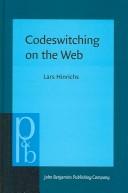
ISBN: 1282155423 9786612155420 9027293309 9789027293305 9789027253903 9027253900 Year: 2006 Publisher: Amsterdam Benjamins
Abstract | Keywords | Export | Availability | Bookmark
 Loading...
Loading...Choose an application
- Reference Manager
- EndNote
- RefWorks (Direct export to RefWorks)
Based on a corpus of private email from Jamaican university students, this study explores the discourse functions of Jamaican Creole in computer-mediated communication. From this participant-centered perspective, it contributes to the longstanding theoretical debates in creole studies about the creole continuum. The book will likewise be useful to students of computer-mediated communication, the use and development of non-standardized languages, language ecology, and codeswitching. The central methodological issue in this study is codeswitching in written language, a neglected area of study at the moment since most literature in codeswitching research is based on spoken data. The three analytical chapters present the data in a critical discussion of established and more recent theoretical approaches to codeswitching. Fields that will benefit from this book include interactional sociolinguistics, creole studies, English as a world language, computer-mediated discourse analysis, and linguistic anthropology.
Code switching (Linguistics) --- Creole dialects, English --- English language --- Electronic mail messages. --- Germanic languages --- English Creole languages --- Negro-English dialects --- Language shift --- Switching (Linguistics) --- Bilingualism --- Linguistics --- Diglossia (Linguistics) --- E-mail correspondence --- E-mail messages --- Email correspondence --- Email messages --- Telematics --- Social aspects --- Electronic mail messages --- Computer architecture. Operating systems --- Pragmatics --- Sociolinguistics --- Creolan languages --- Script switching (Linguistics) --- CHANGEMENT DE CODE (LINGUISTIQUE) --- LANGUES CREOLES (ANGLAISES) --- ANGLAIS (LANGUE) --- COURRIELS --- JAMAIQUE --- ASPECT SOCIAL
Book
ISBN: 9782840161707 2840161702 2840164469 Year: 2013 Volume: *1 Publisher: Paris Presses universitaires de Paris-Ouest
Abstract | Keywords | Export | Availability | Bookmark
 Loading...
Loading...Choose an application
- Reference Manager
- EndNote
- RefWorks (Direct export to RefWorks)
Comment l’entrecroisement des langues nourrit-il la création littéraire et contribue-t-il à construire le cadre historique, géographique et social d’une œuvre ? Ce volume rassemble un ensemble de travaux portant sur les enjeux de l’hétéroglossie dans l’écriture d’un texte et, de façon complémentaire, dans sa traduction d’une langue à une autre. Comprendre les mobiles qui ont incité les auteurs anglophones à emprunter des expressions françaises ou étrangères, montrer comment l’entrelacs des langues participe de l’écriture littéraire et analyser la pertinence de l’interaction des langues dans un texte, voilà les questionnements qui sous-tendent l’ensemble des textes présentés ici. Essentiellement consacré à un corpus anglophone, ce volume ouvre le champ d’investigation à des textes écrits en d’autres langues, notamment le russe et le siamois. Les réflexions engagées abordent les problématiques de la polyglossie à la fois sous l’angle théorique et critique d’une poétique du texte littéraire et sous l’angle pratique de la traduction de ces traces du multilinguisme dans un texte.
Code switching (Linguistics) --- Multilingualism and literature --- Translating and interpreting --- Changement de code (Linguistique) --- Multilinguisme et littérature --- Traduction et interprétation --- Language and languages in literature --- Literature --- Translations --- History and criticism --- 82.03 --- 800.73 --- Vertalen. Literaire vertaling --- Tweetaligheid. Meertaligheid. Vreemde talen. Vertalen --- 800.73 Tweetaligheid. Meertaligheid. Vreemde talen. Vertalen --- 82.03 Vertalen. Literaire vertaling --- Multilinguisme et littérature --- Traduction et interprétation --- Congresses --- Multilingualism and literature - Congresses --- Language and languages in literature - Congresses --- Translating and interpreting - Congresses --- Literature - Translations - History and criticism - Congresses --- Literature, British Isles --- traduction --- écriture --- littérature --- littérature anglaise --- langue --- étranger
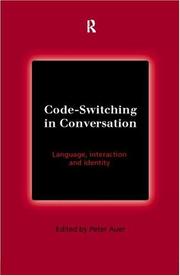
ISBN: 1280442662 9786610442669 1134606737 0203017889 9781134606733 9780203017883 9780415158312 0415158311 9780415216098 0415216095 9781134606689 9781134606726 1134606729 Year: 1998 Publisher: London Routledge
Abstract | Keywords | Export | Availability | Bookmark
 Loading...
Loading...Choose an application
- Reference Manager
- EndNote
- RefWorks (Direct export to RefWorks)
The use of two or more languages within a conversation (known as code-switching) is the subject of this compilation of views from an internationally based team of linguists. The subject is currently of great interest in linguistic circles.
Code switching (Linguistics) --- Conversation analysis. --- Bilingualism. --- Discourse analysis. --- Analysis of conversation --- CA (Interpersonal communication) --- Conversational analysis --- Oral communication --- Discourse grammar --- Text grammar --- Semantics --- Semiotics --- Language and languages --- Languages in contact --- Multilingualism --- Language shift --- Switching (Linguistics) --- Bilingualism --- Linguistics --- Diglossia (Linguistics) --- Conversation analysis --- Discourse analysis --- #SBIB:309H511 --- #SBIB:309H518 --- Verbale communicatie: algemene pragmatiek, stilistiek en teksttheorie, discoursanalyse --- Verbale communicatie: sociologie, antropologie, sociolinguistiek --- Code switching (Linguistics). --- Pragmatics --- Sociolinguistics --- Analyse de la conversation --- Changement de code (Linguistique) --- Bilinguisme --- Analyse du discours --- Alternance de codes (linguistique) --- Script switching (Linguistics) --- Diglossie
Book
ISBN: 9780857457608 0857457608 0857457616 1283655683 Year: 2012 Publisher: New York : Berghahn Books,
Abstract | Keywords | Export | Availability | Bookmark
 Loading...
Loading...Choose an application
- Reference Manager
- EndNote
- RefWorks (Direct export to RefWorks)
Over several generations villagers of Dominica have been shifting from Patwa, an Afro-French creole, to English, the official language. Despite government efforts at Patwa revitalization and cultural heritage tourism, rural caregivers and teachers prohibit children from speaking Patwa in their presence. Drawing on detailed ethnographic fieldwork and analysis of video-recorded social interaction in naturalistic home, school, village and urban settings, the study explores this paradox and examines the role of children and their social worlds. It offers much-needed insights into the study of lang
Language awareness in children --- Communicative competence in children --- Language acquisition --- Language shift --- Linguistic change --- Language and culture --- Conscience linguistique chez l'enfant --- Compétence de communication chez l'enfant --- Langage --- Changement de code (Linguistique) --- Changement linguistique --- Langage et culture --- Acquisition --- Dominica --- Dominique --- Social life and customs. --- Moeurs et coutumes --- Culture and language --- Culture --- Change, Linguistic --- Language change --- Historical linguistics --- Language and languages --- Acquisition of language --- Developmental linguistics --- Developmental psycholinguistics --- Language development in children --- Psycholinguistics, Developmental --- Interpersonal communication in children --- Psycholinguistics --- Children --- Language --- Commonwealth of Dominica --- French Dominica --- Waiʻtu kubuli --- West Indies (Federation) --- Leeward Islands (Federation) --- Windward Islands (Jurisdiction) --- Code switching (Linguistics)
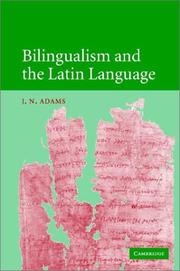
ISBN: 0521817714 0521731518 9786610434435 0511178956 0511042736 0511306091 0511148909 0511482965 1280434430 0511054483 9780511042737 9780511482960 9781280434433 9780511054488 9780521817714 9780521731515 Year: 2008 Publisher: Cambridge Cambridge University Press
Abstract | Keywords | Export | Availability | Bookmark
 Loading...
Loading...Choose an application
- Reference Manager
- EndNote
- RefWorks (Direct export to RefWorks)
Since the 1980s, bilingualism has become one of the main themes of sociolinguistics - but there are as yet few large-scale treatments of the subject specific to the ancient world. This book is the first work to deal systematically with bilingualism during a period of antiquity (the Roman period, down to about the fourth century AD) in the light of sociolinguistic discussions of bilingual issues. The general theme of the work is the nature of the contact between Latin and numerous other languages spoken in the Roman world. Among the many issues discussed three are prominent: code-switching (the practice of switching between two languages in the course of a single utterance) and its motivation, language contact as a cause of change in one or both of the languages in contact, and the part played by language choice and language switching in the establishment of personal and group identities.
Code-switching (Linguistics) --- Foreign elements. --- Bilingualism --- Languages in contact --- Latin language --- Foreign words and phrases. --- Influence on foreign languages. --- Classical languages --- Italic languages and dialects --- Classical philology --- Latin philology --- Areal linguistics --- Language shift --- Switching (Linguistics) --- Linguistics --- Diglossia (Linguistics) --- Language and languages --- Multilingualism --- Foreign elements --- Foreign words and phrases --- Influence on foreign languages --- Latin (Langue) --- Langues en contact --- Bilinguisme --- Changement de code (Linguistique) --- History --- Emprunts --- Histoire --- Influence sur les autres langues --- Mots et locutions étrangers --- Arts and Humanities --- Code switching (Linguistics) --- Historical linguistics --- Sociolinguistics --- Romance languages --- Latin language - Foreign elements. --- Languages in contact - Rome. --- Latin language - Influence on foreign languages. --- Latin language - Foreign words and phrases. --- Bilingualism - Rome. --- Code-switching (Linguistics) - Rome. --- Script switching (Linguistics)
| Listing 1 - 9 of 9 |
Sort by
|

 Search
Search Feedback
Feedback About UniCat
About UniCat  Help
Help News
News